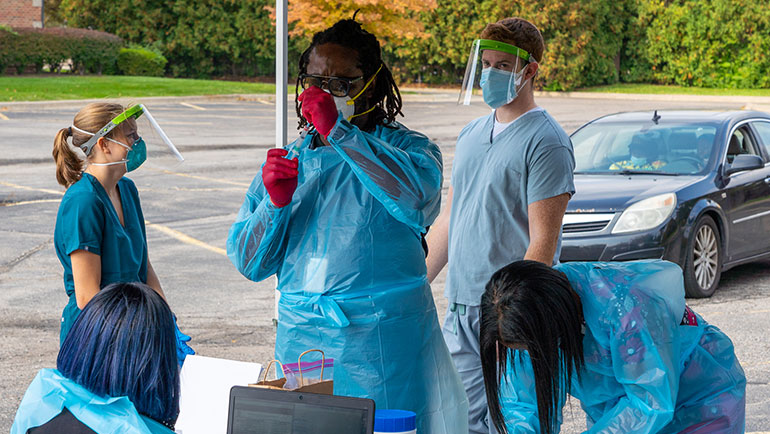
A Wayne State University School of Medicine study highlighting the impact of a panel discussion that increased vaccination intent in a Black audience was announced last month as one of the top five oral presentations given at an April meeting of the Society for Health Epidemiology of America.
“Impact of a Black Physician Panel Discussion on Coronavirus Disease 2019 (COVID-19) Health Education” was published July 29 in the SHEA’s journal, Antimicrobial Stewardship and Healthcare Epidemiology.
The Jan. 18 event, “Black Docs Talk Shots: Clearing Up Concerns and Myths Regarding the COVID-19 Vaccines,” featured 11 Black physicians who answered questions live via Zoom for 251 community members. The event was advertised on social media, and attendees were requested to preregister with their name, e-mail address and country of origin.
Audience questions were categorized, with topics such as vaccine safety, medical mistrust, vaccine safety in pregnancy, vaccine efficacy and vaccine development.
A follow-up poll of participants revealed that 31% of audience members initially unsure or not planning to get vaccinated for COVID-19 changed their mind after the event; 93% believed their knowledge of the vaccines had increased; 95% believed it was important that the information was presented by Black health experts; and 90% reported that they trusted the information presented.
The presentation included information such as the COVID-19 having infected millions of Americans, with more than 600,000 deaths, and that the Pfizer and Moderna vaccines have demonstrated 95% efficacy and received emergency use authorization from the FDA in December 2020. Yet, there have been growing concerns by the public leading to vaccination hesitancy, especially within communities of color, said presenter Jannel Lee-Allen, M.D. ’16.
“Health equity has risen to the forefront in the wake of COVID-19 pandemic. Its disproportionately prognostic effects on marginalized communities and particular here in the city of Detroit have exposed many of the systemic and historical injustices that have both led to health inequities as well as the medical mistrust that drives vaccination hesitancy,” added co-presenter Kenisha Evans, M.D. '17, a fourth-year Infection Control Epidemiology fellow.
“Health inequities exposed by COVID-19, as well as the widespread coverage of George Floyd, Breonna Taylor and countless other unjustified deaths, have led to a national commitment to increasing representation of professionals that serve these communities,"Dr. Lee-Allen said.
The team plans to continue community-based education panel discussions and FAQs for patients via social media platform to continue the appropriate education for most chronic co-morbidities and health prevention, particularly for marginalized communities.
“We are a part of (the same) communities and we are underrepresented. Per the 2014 AAMC Diversity in Physician Workforce, only 4% of physician workforce are African American despite being 13% of the U.S. population, making our perspective very unique,” Dr. Lee-Allen added. “As members of both the community of medicine and underrepresented marginalized communities, we are grateful to see our peers in the field of medicine recognize the value of diverse representation.”
The study group included Dr. Lee-Allen, Gastroenterology and Hepatology chief fellow WSU/DMC; Dr. Evans; Lauren Uroda, M.D. ’15, DMC Family Medicine attending physician; Donald Chinemelu Okoye, M.D., WSU/DMC Internal Medicine-Pediatrics Residency Class of 2020 and an attending physician; Gini Ikwuezumma, M.D., Obstetrics and Gynecology resident-fellow rotator at DMC’s Sinai Grace; Ijeoma Nnodim Opara, MD, ’13, FAAP, FAIM, assistant professor of Internal Medicine-Pediatrics; Hayley Thompson, Ph.D., WSU associate professor of Oncology, Population Studies and Disparities Research Program; and Teena Chopra, M.D., M.P.H. ’11, professor of Internal Medicine, Division of Infectious Diseases.
"Society of Health care Epidemiology of America is an internationally recognized platform, and I am so proud of our team to showcase their strengths at this forum," Dr. Chopra said.